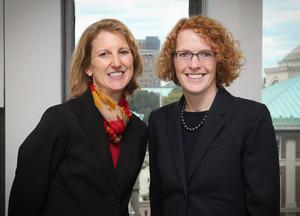Workers' Rights Must Change to Reflect Diverse Nation, Says American Constitution Society President
New York, November 4, 2015—When Caroline Fredrickson ’92 attended Columbia Law School, she was keenly interested in workers’ rights, and she was determined to pursue her interests. On the advice of Professor Mark Barenberg, she wrote letters to the kinds of lawyers she wanted to be, at the kind of firms where she wanted to work (they didn’t interview on campus at that time), to find employment as a summer associate and possibly beyond.
| Caroline Fredrickson '92, left, President of the American Constitution Society for Law and Policy, with Columbia Law School Dean Gillian Lester during Fredrickson's recent visit |
Fredrickson’s recent visit also included meeting with small groups of students and faculty members, including Gillian Lester, Dean and the Lucy G. Moses Professor of Law.
In her introduction to the lecture, Dean for Social Justice Initiatives Ellen P. Chapnick pointed to Fredrickson’s broad range of experience: “For those of you wondering what to do as a public interest lawyer, do it all.”
For Fredrickson, so far, that’s included serving as director of the ACLU’s D.C. legislative office and as general counsel and legal director of NARAL Pro-Choice America. She was chief of staff to Sen. Maria Cantwell (D-Wash.) and deputy chief of staff to then Senate Democratic Leader Tom Daschle (D-S.D.). She also was a special assistant to the head of legislative affairs during the Clinton administration. “One of the things about a law degree is that it enables you to do a lot of things,” she said.
With a wink to Chapnick, Fredrickson referenced the “battle days” at Columbia Law School, when there wasn’t nearly as much support for public interest law. “What has been really amazing to me is to see how that’s grown and developed,” said Fredrickson, applauding the opportunity all students are now given to be exposed to different kinds of work. “That might have been prompted by a little agitation from the student body,” she said mischievously, prompting a laugh from Chapnick and the crowd.
Fredrickson—who was a Harlan Fiske Stone scholar, served on the Columbia Law Review and co-founded the Columbia Journal of Gender and Law—encouraged students to make connections and build relationships by joining the American Constitution Society, which has student chapters in nearly every U.S. law school. “You meet the kind of lawyer you want to be one day,” she said, noting the annual conference featured the likes of U.S. Supreme Court Justice Ruth Bader Ginsburg ’59 and former U.S. Attorney General Eric H. Holder, Jr. ’76.
Fredrickson was on campus to discuss her new book, Under the Bus: How Working Women Are Being Run Over. The exclusion of African-Americans, so many of them women, from the protection of the law is a legacy that has existed since the New Deal, she said. Only one-fifth of the country’s workforce was in jobs covered by the Fair Labor Standards Act of 1938, according to the U.S. Department of Labor. Categories of jobs primarily held by African-Americans, namely domestic and service roles, were carved out of the law under the guise of protecting small businesses. “The congressional record is so explicit,” Fredrickson said, noting that this kind of discrimination also can be found in the Fair Housing Act and the Family and Medical Leave Act. “It isn’t about small business. It’s about racism,” she said. Sexism too: The classification of “women’s work” is the ultimate devaluation, as determined and legislated by a government full of white men.
“What happens to women when they do not have the protection of the law?” Fredrickson asked, shocked by the longevity of this problem, while explaining that she wrote her book as a not-so-indirect response to Lean In, the 2013 book by Facebook COO Sheryl Sandberg.
“I was sort of irritated—we’re not talking about issues that really matter,” she said, crediting Sandberg for addressing some things that are really important, like the tendency of women to succumb to stereotypes. But Fredrickson was struck by what Sandberg didn’t say. What happened, for example, when Sandberg couldn’t get home early for her children? Surely she had a nanny, likely a woman, likely a woman of color, who likely also wished to get back to her own children.
“What we need is not more self-help for women; we need structural change," said Fredrickson, citing the need for all jobs to provide a minimum wage, overtime pay, health benefits, and family leave. “Forty percent of the wage gap is due to discrimination. When discrimination is legal, it happens more.”
